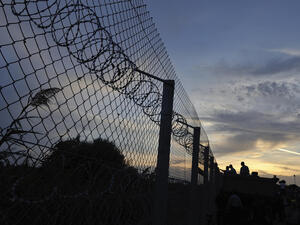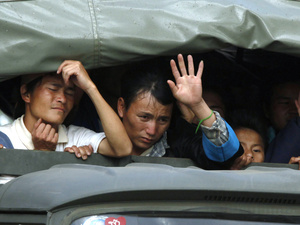Ethnic minorities could face deportation from Russia under new decree
Ethnic minorities could face deportation from Russia under new decree
Refugee or Migrant - word choice matters.
Moscow, April 5 (UNHCR) - More than 13,000 people of Meskhetian ethnicity are facing possible deportation under a new local decree by authorities in the Krasnodar Krai region of the Russian Federation, the UN refugee agency has warned.
The plan sets up "filtration points" to round up "illegal migrants" - mainly Meskhetians and Armenians, according to the authorities - and remove them from the territory of Krasnodar Krai.
In a statement, UNHCR expressed concern about the development, saying it "may lead to the deterioration of the situation and increase discrimination towards the Meskhetian population settled in the region."
The Meskhetians - a largely Muslim group from south-western Georgia - were deported in 1944 to Uzbekistan on Stalin's orders. They faced forced displacement again when, in June 1989, almost the entire ethnic Meskhetian population was driven out of the Uzbekistani part of the Fergana Valley by inter-ethnic violence. Some 90,000 fled, half of them to Azerbaijan and tens of thousands to the Russian Federation.
Most Meskhetians have managed to integrate into the various parts of the Russian Federation where they settled after 1989, and have acquired Russian citizenship.
The exception is the Krasnodar Krai region, where the overwhelming majority of Meskhetians have been unable to obtain permanent legal status. The region is home to between 11,000 and 16,000 Meskhetians, out of a total population of some 5 million inhabitants. Many of the Meskhetians have children who were born in Russia, but only a few thousand Meskhetians have been able to settle legally in Krasnodar Krai.
"Based on the Russian Federation law on citizenship, UNHCR believes the Meskhetians are Russian citizens," said Jean-Paul Cavalieri, a lawyer and senior official with the refugee agency's Moscow office.
"The Meskhetians are former citizens of the USSR who were legally residing on the territory of the Russian Federation at the time of adoption of the 1992 Citizenship Law. On several individual instances the courts of law, including the Russian Federation Supreme Court, have upheld this position," he said.
Without recognition of their citizenship, the Meskhetians live as stateless people. They can face harassment and discrimination, and may not be able to work legally, own land, or even access local health care and schools. The Krasnodar Krai decree now adds another worry - possible deportation from a region where they have resided for more than a decade.
The Meskhetians are one of many different populations displaced within the former Soviet Union after the breakup of the USSR in 1991.
"The Russian Federation has managed to protect and integrate millions of migrants, formerly deported people, refugees and stateless persons, all in accordance with the Constitution and laws of the Federation, and respecting international human rights instruments," said the UNHCR statement. "UNHCR is confident that the situation of Meskhetians in Krasnodar Krai can be similarly addressed."






